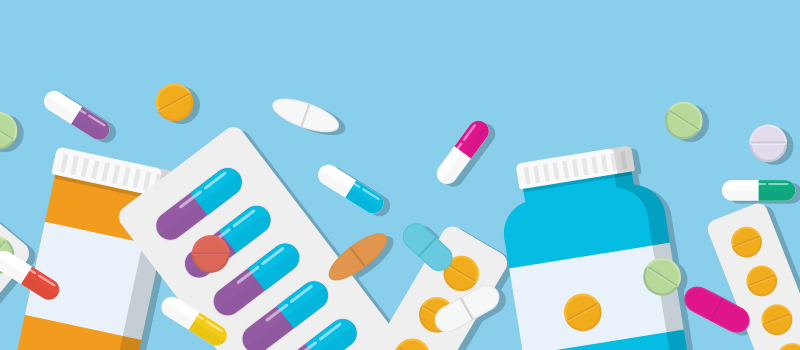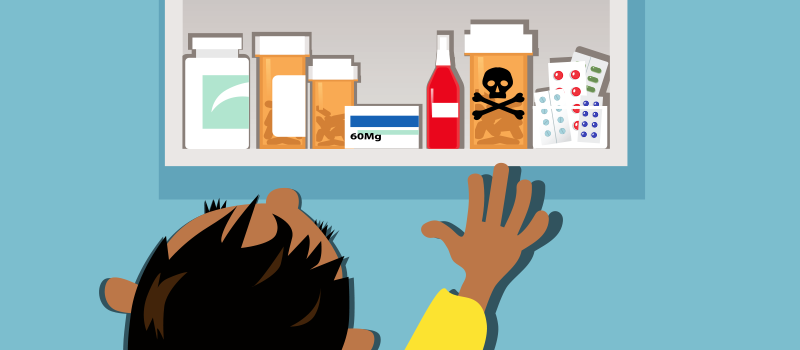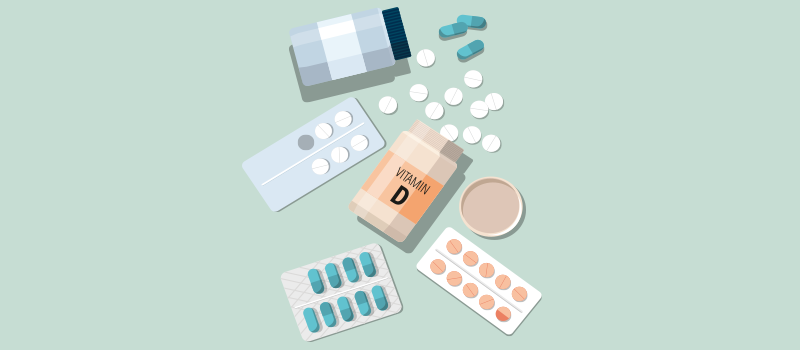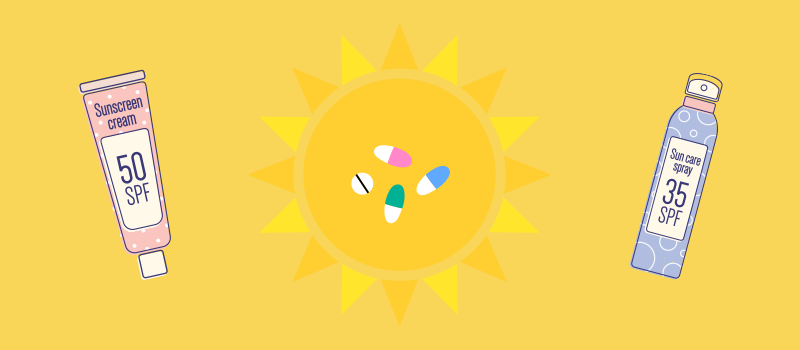What’s the Buzz
The Bee Healthy Blog
What Happens If You Take Expired Medication?

You’ve been working in your yard and your back is hurting. You reach into your medicine cabinet for some ibuprofen, only to find it is way past its expiration date. Should you go ahead and take it?
Sometimes, the high cost of medication, both prescription and over-the-counter, tempts you to use it past its expiration date. You’ve probably heard warnings about not taking expired medication, but is it truly harmful?
Continue reading to find out what happens if you take expired medicine and why expiration dates are important.
What is a medicine’s shelf life?
All medications contain active and inactive ingredients. Even more specifically, certain ingredients determine how effective the remedy is in treating a medical condition. These ingredients also determine how long the medicine can be stored without deteriorating. When pharmaceutical companies develop a drug, they specify the medication’s shelf life, which is the time period for which the medication can be used without deterioration. In other words, the shelf life is the time for which the medicine will work safely and as expected.
The shelf life, therefore, indicates the lifespan of a medication. Please note that drug manufacturers have no financial incentive to prolong the shelf life. Also, it is expensive to test how long medication can remain stable (for example, waiting a decade or more before marketing a drug doesn’t make sense). Manufacturers are, therefore, permitted to choose an arbitrary time frame to test the stability of a drug (which can be anywhere from 12 to 60 months) and stamp the expiration date on the bottle accordingly.
With that being said, a medication’s true shelf life is never truly tested, simply because it’s not worth doing so. The actual shelf life of medications may therefore be longer than indicated by the expiration date. However, some medications have been proven to deteriorate over time, and these medicines should never be taken past their expiration dates (examples include Epipen, insulin, oral liquid antibiotics, and nitroglycerin).
Why are expiration dates important?
The U.S. Food and Drug Administration (FDA) started mandating pharmaceutical manufacturers put an expiration date on prescription drugs as well as OTC (over-the-counter) medications and dietary/herbal supplements in the late 1970s. This was done to ensure people were informed about the product being safe and effective.
Today, drug expiration dates are indicated on the carton, bottle, or label for every medication sold in U.S. markets. This is a legal requirement for pharmaceutical manufacturers because using expired medications can be risky and harmful to the health of patients.
What are beyond-use dates?
Pharmaceutical companies estimate the expiration date of medication by performing stability testing under conditions determined by the FDA. Most medications marketed in the U.S. have expiration dates ranging from 1 to 5 years from the time of manufacture. However, once the original packaging is opened, the expiration date, which was determined under ideal conditions in the laboratory, can no longer be relied upon. The reason for it is that, in the real world, people may not store medicine under ideal conditions. Heat, humidity, light, and other environmental factors can affect the medicine’s stability.
This is why pharmacies are required by law in many states to put beyond-use dates on medication packaging; these are indicated as “do not use beyond MMDDYY” or “discard after MMDDYY” on the bottle. Beyond-use dates are usually one year after the date the prescription was filled. Keep in mind that the beyond-use date determined by a pharmacy is never later than the manufacturer’s expiration date. As a result of this, millions of dollars worth of medications are tossed each year due to them being past the beyond-use date.
What happens if you take expired medications?
When you take expired medication, you cannot be sure of its safety or effectiveness. Expired medicine could cause adverse effects or it may not produce the desired, intended effects leading to worsening of your medical condition.
Expired medications can become less effective because of a decrease in strength due to the change in their chemical composition over time. Some medicines, for instance, are at risk of contamination because of the container. For example, expired antibiotics may fail to treat bacterial infections, leading to serious illness and antibiotic resistance.
That’s why the FDA, doctors, and drug manufacturers advise that if a medicine has expired, you should not use it.
It is worth remembering that while sometimes expired medicines change in their appearance over time; for instance, they appear discolored or cloudy, and can be easily identified as “gone bad.” However, without obvious physical changes, it is often impossible to determine whether or not an expired medicine is safe and effective, so it’s best not to take it.
How long can you take medicine after the expiration date?
The Food and Drug Administration does not recommend taking medications beyond their expiration date. As mentioned previously, the medication’s shelf life may be longer than its expiration date, but consumption of expired medicine is strongly advised against due to numerous unknown factors such as chemical composition and storage conditions, which can affect the potency and safety of the drug.
Why is it important to clean out my medicine cabinet periodically?
Besides the risks of using outdated or expired medication as noted above, there are additional reasons to clean out your medicine cabinet from time to time.
Every day, approximately, 300 children are poisoned in the United States and end up in emergency rooms. Accidental ingestion of a prescription drug makes up the majority of these cases. Opioid pain relievers (OxyContin, Vicodin) have been identified as being particularly dangerous—accidental ingestion of even a small dose of these drugs can lead to serious health complications and even death. Cleaning out your medicine cabinet and safely disposing of old or unneeded medications regularly can help prevent such accidents.
Also, the opioid epidemic is an ongoing issue in the United States. Keeping expired and unused medications such as Xanax or Vicodin in your medicine cabinet increases the likelihood of their abuse. The Drug Enforcement Administration (DEA) warns that many drug overdoses are the result of prescription drugs obtained or stolen from friends and family.
Can you prolong a medicine’s shelf life?
Proper medication storage as directed by the manufacturer will ensure its integrity until the expiration date. Most people store medications in a medicine cabinet in their bathroom, but this is not the ideal place due to frequent heat and increased humidity. The glove compartment of the car is another common place for medication storage; however, this is not recommended due to the fact that medication will be exposed to excessive heat or freezing temperatures. You should be especially careful about following instructions about freezing or refrigerating a medicine. Also, it is crucial to monitor the refrigerator’s temperature for refrigerated medication and not to store these medications in the freezer. For example, when storing insulin vials in the fridge before usage, ensure that the refrigerator’s temperature is not too low that insulin becomes frozen. Freezing temperatures will break down the protein of insulin, rendering it ineffective.
In general, solid medications, such as tablets and capsules, tend to remain stable at room temperature when kept in a cool, dry place away from direct sunlight. Keeping the prescription bottle tightly closed using child-proof caps can prevent accidental ingestion by children and pets while maintaining the medicine’s shelf life.
Solutions, suspensions, and medicines requiring refrigeration are more likely to become less potent if outdated. The solvents in oral solutions can evaporate over time, affecting how the medication works. Preservative-containing medicines, such as certain eye drops, may not be safe to use past the expiration date because the preservatives may no longer be effective against bacterial growth.
Is it OK to take expired ibuprofen?
Ibuprofen in tablet form may remain effective long after its expiration date. Still, there is no way to know for sure. So, while expired ibuprofen could be safe, it’s not a risk worth taking.
Will 10-year-old Xanax still work?
As noted, most medications sold in the United States have an expiration date of 1 to 5 years, during which period they are safe and effective. Xanax tablets usually expire in 2-3 years, depending on the manufacturers. Taking expired Xanax could affect how quickly it is cleared from the body, meaning that it would not be as effective. Expired Xanax can also have unexpected interactions with other medications, affecting the safety and efficacy of one or both drugs. Therefore, you should not take expired Xanax or obtain expired Xanax from friends or family members. Seek medical advice if you think you need a prescription medication.
How to dispose of expired medicine?
Now that you know the dangers of taking expired medication, you may be motivated to clean out your medicine cabinet. The FDA recommends that you check the label for any specific instructions on proper disposal. If there are no special instructions, public drug take-back programs are a good way to get rid of out-of-date drugs. Throwing it in the trash (preferably mixed with something like coffee grounds) is another option. Your prescribing physician or pharmacist can give you more information on the safe disposal of expired medications, or you can check out this guide.
References:
- https://www.health.harvard.edu/staying-healthy/drug-expiration-dates-do-they-mean-anything
- https://www.fda.gov/drugs/special-features/dont-be-tempted-use-expired-medicines
- https://www.ncbi.nlm.nih.gov/pmc/articles/PMC7040264/
- https://www.samhsa.gov/data/sites/default/files/report_3398/ShortReport-3398.html












SOCIAL